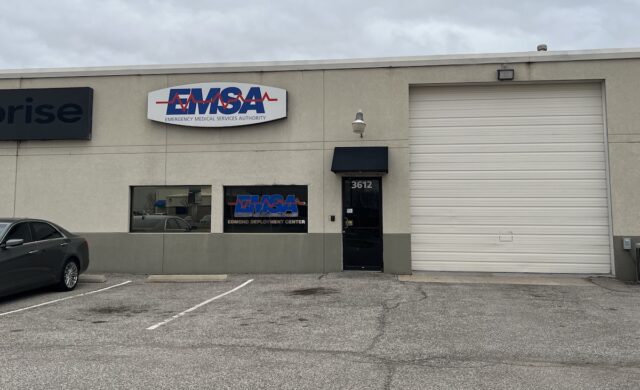

The Emergency Medical Services Authority has provided emergency medical transport services for Edmond residents since 1990, but that could change after EMSA has consistently struggled to meet its required response times since the pandemic.
Under its agreements with its non-beneficiary cities, Edmond, Nichols Hills and The Village, EMSA is required to collectively respond to Priority 1 calls in those areas in under 11 minutes at least 90 percent of the time. Priority 1 calls are those that can include life-threatening situations like heart attacks, strokes and serious injuries sustained in car accidents.
On-time Priority 1 Edmond EMSA response calls in 2022:
January: 38%
February: 44%
March: 53%
April: 51%
May: 46%
June: 38%
July: 28%
August: 41%
September: 42%
October: 37%
November: 61%
December: 65%
According to those same agreements, EMSA must respond to Priority 2 calls in less than 25 minutes at least 90 percent of the time. Priority 2 calls are less severe and include falls, broken limbs and minor vehicle accidents.
EMSA calculates compliance within each of its non-beneficiary cities individually, but its contract agreement only pertains to its combined compliance of all non-beneficiary cities.
Throughout 2022 in Edmond, EMSA responded to Priority 1 calls under 11 minutes about 46 percent of the time and responded to Priority 2 calls under 25 minutes about 70 percent of the time. However, staffing increases did help improve the response times in November and December.
‘Just no sense of urgency’
Lindsey Martin, an Edmond resident, believes a quicker response time could have saved her mother’s life when she was involved in a head-on car accident while being driven to a hair appointment in October.
Martin’s mother, Vickie Nichols, lived with a virus called transverse myelitis for 35 years. Nichols and her husband, Pat, founded Nichols Travel in 1978, which Martin owns today.
“She [had] been paralyzed from basically the waist down for a very long time and had lived that way successfully for all these years,” Martin said.
When a driver passed out and drifted into oncoming traffic on West 33rd Street between South Kelly Avenue and South Santa Fe Avenue on Oct. 6, EMSA was called to assist the unconscious woman, Martin said. At 9:54 a.m., an EMSA ambulance was requested and arrived on scene at 10:17 a.m., according to records shared with NonDoc by Martin.
After responding firefighters removed Nichols and her caretaker from their wrecked vehicle, Martin — who arrived on the scene after being notified of the accident — said her mother began to “deteriorate.”
“She was like, ‘I feel dizzy. I feel nauseous,'” Martin said. “You have got to keep in mind, she is also paralyzed, so she does not feel how we feel. Something was going on.”
A second EMSA ambulance was requested for Nichols at 10:04 a.m. It arrived at 11:06 a.m.
“Following them, they never had their lights on. I was able to park at Mercy and meet them over at the front before they had her fully out of the ambulance,” Martin said. “It was just no sense of urgency.”
Nichols slipped into a coma and died at 4:43 a.m. the next morning. The Oklahoma State Medical Examiner’s Office stated that Nichols died from “multiple blunt force trauma caused by the collision,” according to the fatality report, written by Edmond police Sgt. Greg Jaggi.
Nichols’ death came as a surprise to Jaggi, he wrote in the fatality report. As fire personnel stood on scene waiting for the second EMSA ambulance to arrive, Jaggi was able to leave the scene.
“When I left the scene of the collision, I had no idea that this collision could result in a fatality collision,” Jaggi wrote. “As far as I was concerned, this was a minor injury collision.”
The City of Edmond’s contract with EMSA is for $600,020 and expires on June 30, 2023. A vote to renew or reconsider the contract is expected to be brought before the Edmond City Council prior to its expiration.
“There was no doubt in my mind that, had she been seen earlier, the outcome could have been different,” Martin said.
For more Edmond news:
‘We’re not willing to accept this standard anymore’
On June 27, about three months before Nichols’ death, the Edmond City Council approved a contract renewal with EMSA by a 4-1 vote. Ward 2 Councilman Josh Moore cast the lone vote against renewal as a “statement,” he said.
“With my ‘No’ vote, I knew that we did not have another service lined up,” Moore said. “But I did want to make a statement to my other council members, the city manager and EMSA that I’m not pleased with where this is at.”
If the Edmond City Council waits until after April to consider renewing the EMSA contract, Josh Moore will no longer be serving on the council. His seat will be held by either Judy Rau or Barry Moore, candidates for the Ward 2 seat.
Nonetheless, Josh Moore believes the city should look elsewhere for emergency response services.
“I do believe that the city, that everybody — my fellow council members, city management — is on board that we’re not willing to accept this standard anymore,” Moore said. “There are other options to change and to use a different service that we can demand that those response times are met.”
But Edmond City Manager Scot Rigby, who serves on the EMSA Board of Trustees, said he has been working with EMSA on improving response times and that the city is still planning to contract with EMSA, despite its poor compliance.
“Our goal right now is to continue to work with EMSA and see that they continue to improve, but just like any other contract the city has, we periodically look at those and say, ‘Are we getting the best service for the dollars that we’re providing?’ So, whether it’s EMSA, or take another third-party agreement we have, we’re constantly evaluating,” Rigby said. “But for stuff like public safety, you have got to be really careful. You can’t really start it and then hopefully it works out. You have got to really be confident if you’re going to make a change that, day one, you’re up and ready to go.”
EMSA spokesman Adam Paluka said staffing shortages since the pandemic have brought challenges to EMSA’s call compliance.
“As we all know, health care staffing over the last three years has been really precarious because of the pandemic and because of people who’ve decided to leave the profession, because the schools [went] on hiatus and [were not] able to graduate as many EMTs and paramedics,” Paluka said.
To increase staff, EMSA’s Board of Trustees approved an agreement with Best Practice Medicine in September to bring 40 paramedics into the EMSA system for 180 days.
Since its temporary employee staffing agreement with BPM, EMSA responded on time to Priority 1 calls at a 61 percent rate in November and a 65 percent rate in December — the second-highest and highest rates throughout 2022. In January 2023, which marks EMSA’s latest compliance report, that number climbed to 73 percent.
“When you ask about the response times in Edmond, I do think it’s important to point out how much they have improved since early 2022. We still know that we have work to do and we’re working every day to improve response times across the Western Division,” Paluka said. “But one thing that we cannot control is that we are experiencing record-breaking volume that is highly above any predicted volume increase that we thought we would see.”
Tulsa’s response times have hovered above 90 percent compliance throughout the latter six months of 2022. Paluka said the Oklahoma City metropolitan area is much larger than Tulsa’s, which makes it more difficult for ambulances to travel from one place to another.
“Oklahoma City is very sparse. The western division does have more people, but it’s that geographic footprint that is just incredibly difficult,” Paluka said. “But we’ve known about that, and that’s why it was important for us to get more of those paramedics into the system.”
Ward 4 Edmond City Councilwoman Stacie Peterson, who holds a nursing degree from the University of Central Oklahoma, said she is “cautiously optimistic” about the EMSA response time increases over the last few months.
“I think about my family, I think about myself, and if I’m concerned about myself and my family, I’m concerned about my city. So, the fact that the numbers are going up makes me cautiously optimistic,” Peterson said. “I don’t have a problem making a decision if it does not.”
Ward 3 Edmond City Councilwoman Christin Mugg said the Edmond City Council is worried about the issue.
“Obviously, we’re concerned and we care,” Mugg said. “Beyond that, I don’t have a lot of detail.”




















